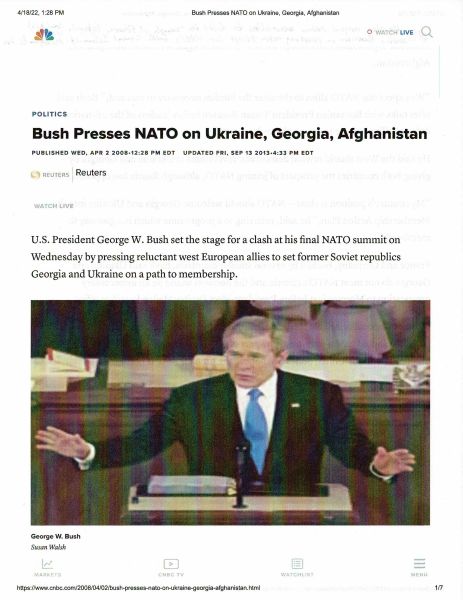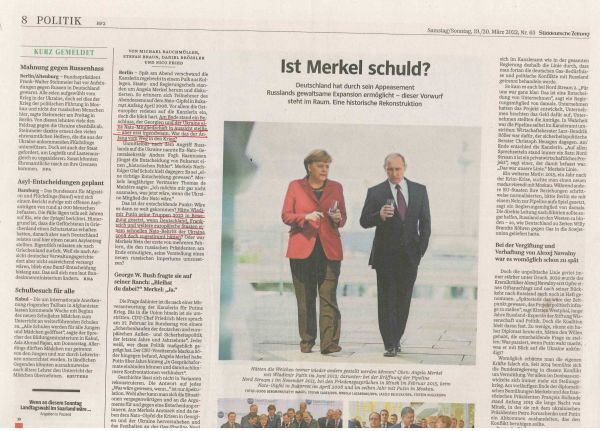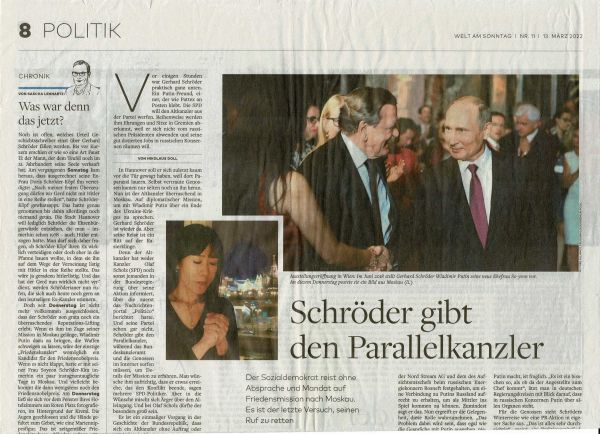Schröder, Merkel, and Putin
German leaders like Conservative Chancellor Angela Merkel and her Socialist predecessor Gerhard Schröder have come under fire recently, since Russian leader Vladimir Putin betrayed them, and launched the invasion of the Ukraine--forcing Merkel and Schröder to share responsibility for it. The invasions started during my last visit to Germany, although Germany only felt the full effect of the economic sanctions against Russia after I left. But informed Germans had already started worrying about the ripple-effect of the sanctions on the availability of fuel for transportation and residential heating, a shortfall of cereal grains for food-production, livestock feed, and domino-effect on the economy.
Merkel and Schröder came under fire when informed Germans learned that the Russians had talked them into building their Nordstream Pipeline to by-pass Ukraine. The two chancellors also rejected Ukraine's efforts to join NATO. Unintentionally, they set up the conditions favorable for an invasion. And not only did they set up the Ukraine, but they did so over the heated objection of former President George W. Bush. In 2008, Bush made his plea for Ukraine's inclusion before an assembly of NATO leaders. But the German delegates—and really just about everyone else at that time—thought Bush made a big deal out of nothing.
German newspapers have really had a field-day dishing out blame to their leaders for enabling the Russian invasion. See this article in Die Süddeutsche newspaper, "Ist Merkel schuld?" (Is Merkel to blame?) For newspapers to ask a rhetorical question, they expect readers to reply "Ja! Natürlich!" Merkel is to blame! She and Schröder both. Their only real sin was to underestimate the evil of Putin and others in his circle.
On March 13, 2022, Die Welt newspaper published an article that asks the same rhetorical question about Gerhard Schröder: "Is Schröder to blame?" It appeared after informed Germans learned that Schröder had taken an unauthorized trip to Russia to persuade Putin to break off his invasion. As the former Chancellor, he needed to inform German Chancellor Olaf Scholz and his party's leadership of his travel plans—not to act as a "parallel Chancellor."
In spite of all the hoopla, I am guessing Schröder did inform them. They looked the other way and played ignorant. He had their totally deniable blessing to visit Putin and salvage his reputation after the invasion—not only Schröder's reputation but all those in the Socialist Party who had a part in enabling Putin's territorial ambitions.
For a literary perspective, consider looking at John le Carré's novel Smiley's People. Le Carré tells the story of spy-hunter George Smiley, who must bend some rules in order to find out who killed a retired double-agent from Russia. Smiley has to clear the operation with his superior Saul Enderby. Enderby okays Smiley's operation, but pretends to look the other way as Smiley undertakes it, just as Scholz must have okayed Schröder's visit:
"You'll need people. Don't talk to me about it, find your own. . . . I'll watch you day and night.
If the ploy aborts and there's a scandal . . . I'll say I suspected you might be slipping the leash . . .
I'll say the whole catastrophe was a ludicrous piece of private enterprise by a senile spy who's
lost his marbles."
"Thank you," said Smiley politely.
"Meanwhile, you have my totally deniable blessing. . . ."
"Thank you," said Smiley again.



